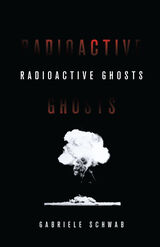
A pioneering examination of nuclear trauma, the continuing and new nuclear peril, and the subjectivities they generate
Amid resurgent calls for widespread nuclear energy and “limited nuclear war,” the populations that must live with the consequences of these decisions are increasingly insecure. The nuclear peril combined with the looming threat of climate change means that we are seeing the formation of a new kind of subjectivity: humans who are in a position of perpetual ontological insecurity. In Radioactive Ghosts, Gabriele Schwab articulates a vision of these “nuclear subjectivities” that we all live with.
Focusing on the legacies of the Manhattan Project, Hiroshima, and nuclear energy politics, Radioactive Ghosts takes us on a tour of the little-seen sides of our nuclear world. Examining devastating uranium mining on Native lands, nuclear sacrifice zones, the catastrophic accidents at Chernobyl and Fukushima, and the formation of a new transspecies ethics, Schwab shows how individuals threatened with extinction are creating new adaptations, defenses, and communal spaces. Ranging from personal accounts of experiences with radiation to in-depth readings of literature, film, art, and scholarly works, Schwab gives us a complex, idiosyncratic, and personal analysis of one of the most overlooked issues of our time.

How do aesthetic forms contribute to different kinds of cultural knowledge? Gabriele Schwab responds to this question with an analysis of the nature of subjectivity in modernist fiction. Drawing on French and Anglo-American psychoanalysis as well as reader response theory, she explores the relationship between language and subjectivity and in so doing illuminates the cultural politics and psychological functions implicit in the aesthetic practices and literary forms of modernism and postmodernism. The result of this exploration is a new understanding of the function of literature as a form of cultural knowledge.
Schwab demonstrates how literature creates a transitional space where boundaries of language and subjectivity are continually aped and reshaped on both an individual and a cultural eve. Modern and postmodern experimental texts, in particular, fulfill this function through the multifarious exploration of the boundaries of poetic language and their opening to the unconscious. Undertaking what she terms a literary ethnography of the decentered subject, Schwab examines five novels: Herman Melville's Moby-Dick, Virginia Woolfs The Waves, James Joyce's Finnegans Wake, Samuel Beckett's The Unnamable, and Thomas Pynchon's Gravity's Rainbow. Schwab demonstrates how the aesthetic figurations of unconscious experience in these texts generate new forms of literary language and an aesthetic reception that is directly relevant to an increasingly global and hybridized culture.
In her concluding chapter, which introduces the notion of “textual ecologies,” Schwab analyzes the literary subjectivity of “transitional texts” in light of such contemporary theories as systems theory, cybernetics, and the new physics. From this perspective, such texts not only reflect cultural practices but take part in shaping their change and innovation.
READERS
Browse our collection.
PUBLISHERS
See BiblioVault's publisher services.
STUDENT SERVICES
Files for college accessibility offices.
UChicago Accessibility Resources
home | accessibility | search | about | contact us
BiblioVault ® 2001 - 2024
The University of Chicago Press









